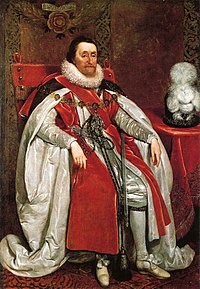
As I visited the Life and Legacy of the King James Exhibit at the Harold B. Lee Library I was able to learn so much about the history of something I hold so sacred. The Bible has played such a role in my life as I based much of my conversion to the Church of Jesus Christ of LDS on it and my personal testimony.
Just as King James I rose to the thrown, tensions were growing between the Puritans and the Church of England, especially since the puritans rejected the divine authority of kings. King James I believed that the Puritans, along with the Geneva Bible, were hindering the monarchy.
In 1604, he gathered an assembly of Puritan and Church of England leaders together to let their resentments and grievances air out about the church reforms. James did not approve of the propositions made by the Puritans but he did listen up when they mentioned a possible new Bible translation. Although the puritans may have wanted a retranslation of the Bishop’s Bible, James commissioned a new translation entirely.

Richard Bancroft, the Bishop of London, who then qualified scholars and translation rules to guide the work, oversaw the process of the new translation. He established ecclesiastical posts for the translators, since neither the King nor Parliament were paying for the new translation. Portions of the Biblical text were divided between groups of translators. Their ultimate goal was to find the most accurate translations for the Greek or Hebrew terms, even if that meant adding marginal notes. The divided translations were
then brought together for the final review in front of a group of delegates for approval. After that, the final copy was given to the King’s printer, Robert Barker, (who had a royal patent which allowed him the monopoly on the printing of Bibles.)
Barker received no payment for printing the King James Version of the Bible from the King, the Church of England, or Parliament. Instead he made financial partners to help with the burden of buying new types, paper, ink, and labor. This information and more on the topic can be found
.
So many people were dedicated to finding the most inspired and direct word of God. We can see that the coming about of His word has a long history with many people giving so much to a cause they felt was inspired. Where would we be without the King James Version?
Madison, this is a great history of the Bible, but what did you learn that relates to you?
ReplyDeleteLike Erin said, how has their work impacted you personally? It was interesting to learn about Robert Barker. I didn't know that the printer didn't actually get paid.
ReplyDeleteIt just makes me wonder where we would be in we didn't have so many people dedicated to bringing forth truth. It really relates to me because the Bible is such a large part of my life, and I've depended so much on it for so many things. Sorry, thought it was clear when I said, in the beginning of the post, that I base so much of my learning and conversion to the LDS Church on the Bible, (and at the end of the post) when I questioned where we'd we without it.
ReplyDeleteMadison, I got that from the beginning, but sometimes it feels like a superficial when the connection is not drawn out during the whole post. Kimberly, why do you think that so many more people started getting paid for as codices turn to books?
ReplyDelete